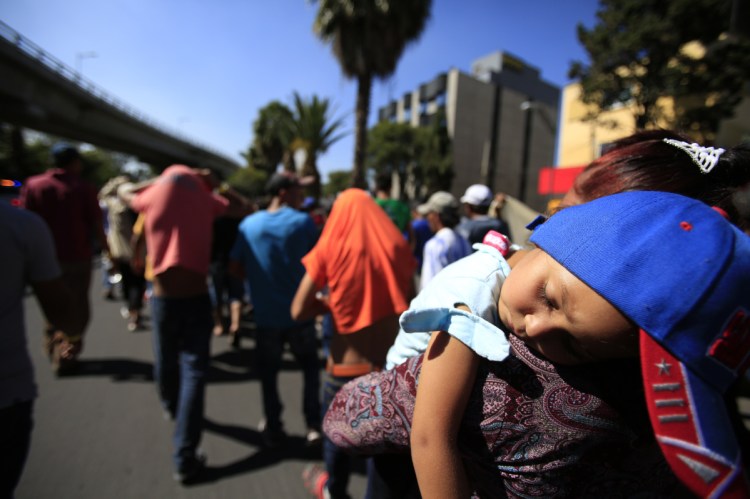MEXICO CITY — The migrant caravan began another leg toward the U.S. border on Saturday, continuing the journey north from Mexico City a day after the Trump administration moved to restrict asylum options for unauthorized immigrants. The group waited in the capital for almost a week, hearing snippets of information about the militarization of the border and the U.S. midterm elections.
Members of the caravan appeared undeterred, affirming that returning to their home countries was not feasible. They boarded the subway before dawn to reach the outskirts of the Mexican capital.
The most pressing question: How long would it take to travel the 1,700 miles to Tijuana, on the border with California? Many vowed they would eventually cross into the United States.
The Trump administration’s new measures, which were announced Thursday, deny asylum to people who enter the United States between official ports of entry. Those arrivals can seek lesser status known as “withholding of removal” or protection under the Convention Against Torture. Either would temporarily prevent them from being deported but provides no path to permanent legal status.
‘HEADED TO … THE BRIDGES’
All those who enter via official ports of entry will be able to seek asylum, and many caravan members say that’s their plan.
“If God wants it, we’re going to ask for political asylum on the border,” said Lourdes Martinez, 25, from La Ceiba, a coastal city in Honduras. She said she did not foresee problems since she would not be breaking the law. “I’m headed to one of the bridges, not crossing the river or anything like that.”
She was convinced she had a shot at making it to the United States, along with her husband and their 4-year-old daughter, because they were fleeing forced recruitment by the MS-13 gang in their hometown. Even when U.S. lawyers volunteering in Mexico warned that the family could be detained for more than a year during asylum proceedings, she was not dissuaded.
The American Civil Liberties Union and other civil rights groups filed a lawsuit challenging the presidential proclamation hours before it took effect on Saturday. Trump’s decree remained a concern among the lawyers, wearing orange fluorescent hats, who stood out from the crowd of migrants. They walked around offering 10-minute summaries about asylum to migrants sprawled on the bleachers and in plastic tents in a sports stadium in Mexico City where they slept.
“People don’t understand their rights as asylum seekers, or refugees, even when they have strong asylum claims,” said Arturo Viscarra, a member of the U.S.-based National Lawyers Guild. He noted Central Americans have been crossing the U.S. border for decades.
DISPIRITING NEWS
But now, Viscarra said, “they have incredible wait times at ports of entry” – a situation that is only likely to get worse when the caravan reaches the border. Already, forced waits at official crossing points that can be weeks long have led people to cross illegally. Viscarra said he had documented cases in the border city of Reynosa in which migrants with asylum claims were turned away at bridges, then crossed between ports of entry, only to request asylum from U.S. authorities after they were detained.
That will be impossible under the new rules, at least for the next 90 days.
Some members of the caravan didn’t want to hear such dispiriting news. Sofia Sanchez, 40, from Cofradía, Honduras, who was traveling with her nephews, said she was more focused on the unity of the caravan than on hypothetical problems.
“They bring our morale down by telling us families could be separated,” Sanchez said. “I believe that God will help us, and we want to reach the other side of the border.”
Trump’s move applies to anyone who crosses the border without documents, but it has been seen as a pre-emptive step against the caravan, which has provoked the president’s ire since it left Honduras in mid-October. A previous caravan in the spring also traveled to Tijuana, where 401 people eventually sought asylum. But the administration reported it had also apprehended alleged caravan members who crossed illegally.
Rodrigo Abeja, a member of the activist collective Pueblo Sin Fronteras, which has been helping coordinate the caravan, said single men seeking work were most likely to attempt to cross between ports of entry, while others – entire families, women with children, unaccompanied minors or LGBTQ migrants – would be more likely to seek asylum.
Send questions/comments to the editors.



Success. Please wait for the page to reload. If the page does not reload within 5 seconds, please refresh the page.
Enter your email and password to access comments.
Hi, to comment on stories you must . This profile is in addition to your subscription and website login.
Already have a commenting profile? .
Invalid username/password.
Please check your email to confirm and complete your registration.
Only subscribers are eligible to post comments. Please subscribe or login first for digital access. Here’s why.
Use the form below to reset your password. When you've submitted your account email, we will send an email with a reset code.